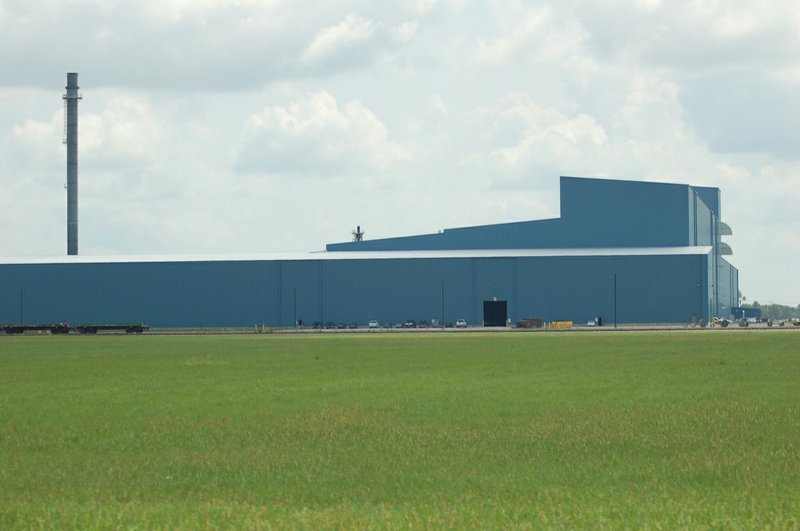The Arkansas Senate Revenue and Taxation Committee on Wednesday advanced a bill that would extend an income tax credit for steel manufacturers that purchase certain waste reduction, reuse and recycling equipment.
With no dissenting votes, the committee recommended Senate approval of Senate Bill 543 by Sen. David Wallace, R-Leachville.
Wallace said Mississippi County is the second-largest steel-mill producing county in the nation and jobs in the steel industry in Arkansas have grown by 38% in the past 10 years.
For qualifying projects, the bill would allow for recycling tax credits to be calculated at 30% of the expense of the eligible equipment, he said.
To qualify for the income tax credit, the project must have a total investment of more than $250 million, he said.
"We already have one of those getting ready to start," Wallace said. Afterward, he said the project would be at Big River Steel.
To qualify for the income tax credit, the project also must create at least 150 new jobs with an annual wage of $75,000 a year, he told the Senate tax committee.
"The tax credits will not be available until after the facility is operational and the jobs and wages are met," Wallace said.
"Most importantly, this legislation requires that the project produce a cost-benefit to the state."
The income income tax credit is available under current law to qualified steel specialty products manufacturing facilities that started construction or or after Jan. 1, 2017, with a closing date before July 1, 2018, the state Department of Finance and Administration said in its legislative impact statement on the bill.
SB543 would extend the income tax credit to qualified steel specialty products manufacturing facilities that commerce construction on or after Jan. 1, 2021, with a closing date before July 1, 2023, the department said.
By the July 1, 2023, closing date, the qualified taxpayers must have obtained the necessary capital acquisition and borrowing to secure a site, obtain engineering services, purchase equipment and commence initial construction.
No tax credits would be issued to a taxpayer unless the project is determined to have a positive cost benefit analysis as certified by the Arkansas Economic Development Commission and the Office of Economic Analysis and Tax Research and a performance and clawback agreement is signed by the taxpayer and the commission, according to the finance department.
The credits may be claimed against income taxes owed at a minimum of $4 million per year if the investment is $200 million to $275 million, $5 million per year if the investment is between $275 million and $350 million, and $6.5 million per year if the investment is more than $350 million, the finance department reported. Unused credits may be carried forward until fully claimed.
The bill would be effective for tax years starting on or after Jan. 1, 2021.
It also would allow a public retirement system that has tax credits from an investment in a qualified steel specialty products manufacturing facility to sell or transfer those credits, according to the finance department.
The state may purchase the credits from a public retirement system for 80% of face value.
In mid-January, U.S. Steel announced that it had closed on its acquisition of the remaining equity of Big River Steel for about $774 million in cash. In October, U.S. Steel bought 49.9% of Big River for $700 million. The total cost for the purchase of Big River is nearly $1.5 billion.
Arkansas Teacher Retirement System Director Clint Rhoden said Wednesday in a written statement that the system invested in Big River Steel and received about $277 million from the sale to U.S. Steel. The system also has about $176 million in tax credits associated with Big River Steel, he said.
Paul Gehring, an assistant revenue commissioner for the finance department, told the committee, "we are not indicating a fiscal year revenue impact [from SB543] that we are anticipating that would impact either changing the general revenue forecast or affecting the governor's balanced budget.
"This is the same analysis that we did for a prior piece of legislation that created a similar tax credit for the wood industry, so we are not anticipating that this bill would have any impact on the forecast that would be issued in May if it were to pass," he said.
Act 594 of 2021 -- House Bill 1706 by Rep. Jeff Wardlaw, R-Hermitage -- creates a new tax credit for wood energy product and forest maintenance projects. The credit is equal to 30% of the purchase price of qualifying equipment with a required minimum investment of $50 million, the finance department said.
The wood or forest project also will be required to create at least 100 new full-time permanent jobs with an average salary of $60,000 a year. The project must show a positive economic benefit.
If the wood energy project is partially owned by a public retirement system in Arkansas, $5 million of credits per year may be purchased back by the state at 80% of the face value of the credits each year, according to the finance department. Act 594 is effective for tax years starting on or after Jan. 1, 2021.
Wardlaw said he expects the act to benefit at least three pellet mills in Pine Bluff and Stephens.
Rhoden said Act 594 of 2021 provides possible benefits for several Teacher Retirement System investments.
The system has an investment in a wood pellet production company located near Pine Bluff and also owns timberland across Arkansas, he said, and these investments could potentially benefit from incentives provided to companies through this law.
